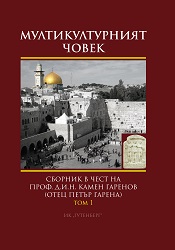Религиозен живот в Източна Румелия
Religious life in Eastern Roumelia
Author(s): Stanislav Boyanov
Subject(s): History, Cultural history, Comparative history, Diplomatic history, Ethnohistory, History of ideas, Local History / Microhistory, Political history, Modern Age, Special Historiographies:, Theology and Religion, 19th Century, Period(s) of Nation Building, The Ottoman Empire, History of Religion
Published by: Издателска къща "Гутенберг"
Keywords: Balkan history; History; History of religion; Ottoman empire; XIXth century; nineteenth century
Summary/Abstract: Eastern Roumelia received its fundamental law drafted by a specially European commission. It is quite a detailed document providing for all aspects of life of the Roumeli citizens. The Organic Statute of Eastern Roumelia defined the new political formation in the Balkans as a state of modern (for that time) bourgeois-liberal type. It had all the features of and independant state: its own government, a representative authority elected by the people and a national army. The sovereignty of the sultan was included in the Statute, but thanks to the efforts of Eastern Roumeli political figures, it soon became nominal, without any serious power in the region.
Unlike the neighboring countries (the Ottoman Empire, the Principality of Bulgaria, Serbia, Greece and Romania) there was no legalized and preferred religion in Eastern Roumelia. All religious issues were placed in the hands of the religious communities and the state did not involve itself with them. The only condition was that they should not violate any of the laws valid to the region.
- Page Range: 266-272
- Page Count: 7
- Publication Year: 2016
- Language: English, Bulgarian
- Content File-PDF

